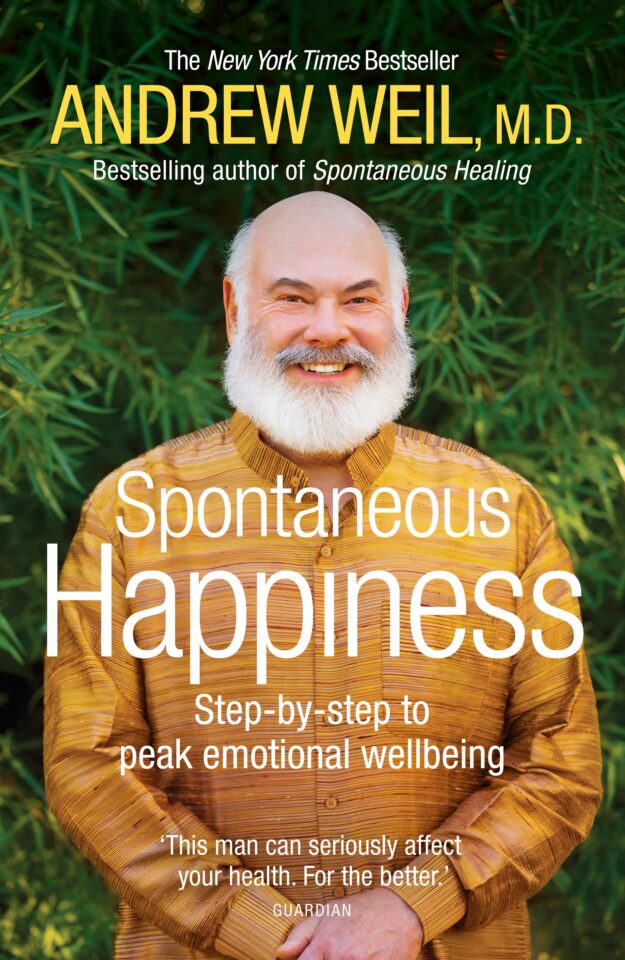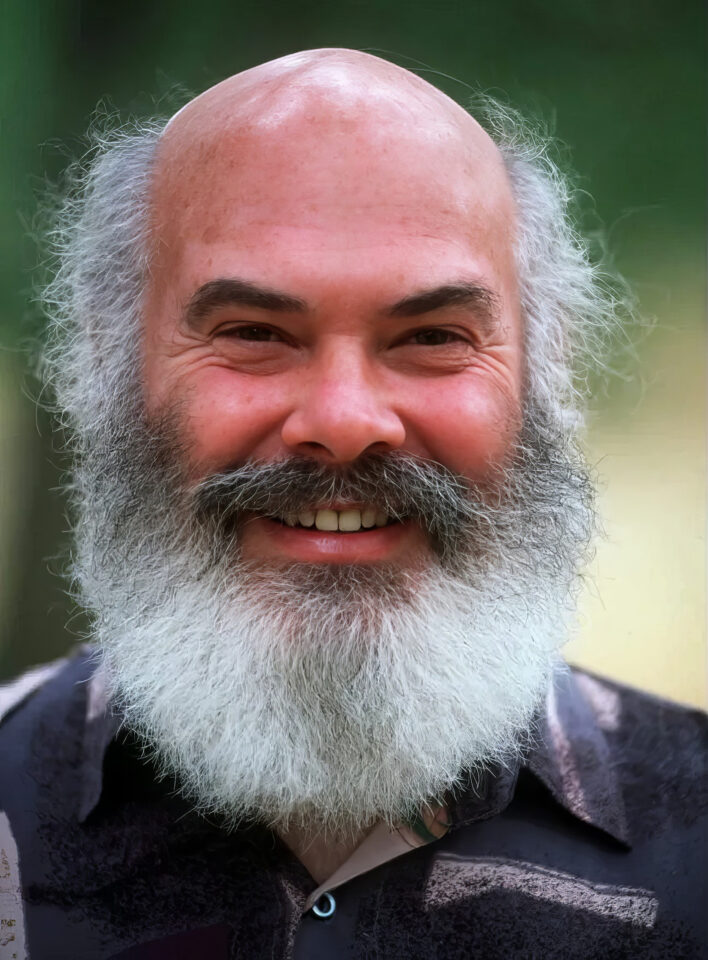Have you ever felt stuck in a loop of low moods or anxious thoughts, where real happiness feels just out of reach?
It’s a feeling so many of us know well.
This spontaneous happiness book review explores Dr. Andrew Weil’s incredible roadmap to joy, which blends smart science with timeless wisdom to boost your emotional well-being.
We’re going to walk through some simple, powerful ideas from the book that you can use right away. Think of it as a friendly guide to lifting your mood, building resilience, and finding a little more balance in your life, without any quick fixes or complicated steps. Let’s get started.
Key Takeaways
Dr. Andrew Weil, a Harvard-trained medical doctor (Biology 1964, MD 1968) and founder of the Arizona Center for Integrative Medicine, combines Eastern methods like mindfulness with Western science in his book “Spontaneous Happiness,” which earned praise from Kirkus Reviews.
The book features an eight-week program built on evidence-based advice, including omega-3 supplementation, an anti-inflammatory diet rich in foods like olive oil and salmon, daily exercise, gratitude journaling, and specific mindfulness techniques like the 4-7-8 breathing exercise.
Weil challenges traditional psychiatry‘s focus on symptoms, instead recommending practical steps like tracking moods, improving sleep by avoiding blue light at night, building strong social connections, and spending time in nature to naturally boost your emotional health. A 2022 study in the journal *Translational Psychiatry* confirmed that time in nature can reduce stress-related brain activity.
“Spontaneous Happiness” is most effective for mild to moderate depression but offers less guidance for severe psychiatric conditions like schizophrenia or bipolar disorder. Its gradual, lifestyle-focused approach may not be a fit for readers looking for immediate solutions.
In 2025, the turn toward integrative therapies continues to grow, with wellness apps like Calm and Headspace surpassing a combined 150 million downloads. Weil’s multi-faceted method aligns with this trend, offering accessible strategies through formats like the audio editions from Hachette Book Group.
Table of Contents
Overview of “Spontaneous Happiness”
Dr. Andrew Weil pulls from his deep experience in psychiatry, integrative medicine, and alternative medicine to explore our search for contentment. He uses a mix of personal stories and scientific studies to offer a fresh perspective on emotional resilience and well-being.

Who is Andrew Weil and what is his approach?
Andrew Weil, M.D., was born in Philadelphia in 1942. After earning his biology and medical degrees from Harvard by 1968, he went on to establish the Arizona Center for Integrative Medicine in 1994, pioneering a new way to look at health.
His approach, praised by Kirkus Reviews, is all about connection. He skillfully blends Eastern practices like mindfulness meditation with modern Western science in nutrition and psychology.
Weil challenges the old psychiatric model that treats the mind and body like they’re separate. Instead, he empowers women with an eight-week wellness program that focuses on actionable changes. These include:
- Dietary adjustments: Incorporating anti-inflammatory foods and fish oil supplements rich in omega-3s.
- Mind-body practices: Daily habits built around gratitude, forgiveness exercises, and spiritual connection.
- Physical activity: Simple, consistent exercise routines to combat social isolation and build resilience.
His work is grounded in the principles of positive psychology, helping people build a strong foundation against depression.
Mind-body inseparability is not a theory; it is an experience, writes Andrew Weil in Spontaneous Happiness.
I tried one of Dr. Weil’s breathing exercises from my Kindle app last fall while feeling overwhelmed by holiday stress, and it was surprisingly effective!
How does the book address emotional well-being and holistic health?
Dr. Weil suggests that many traditional mental health treatments focus too much on managing symptoms instead of finding the root cause. He encourages women to look past the quick fix of a prescription receipt or another psychotherapeutic session paid by credit card.
His book provides a toolkit of practical methods rooted in Buddhist psychology, such as daily meditation and mindfulness. Diet is a cornerstone of his philosophy. Dr. Weil recommends adding omega 3 supplementation and focusing on plant-based meals while cutting back on processed foods often sold at a low market price by major retailers like Amazon.
Physical health is directly linked to emotional well-being. The book emphasizes building routines around regular exercise and restorative sleep. It also highlights the importance of social connections to ease the suffering from depression and spark creativity.
Even your environment matters. I took his advice one winter and started reading my Paperwhite near an open window for more sunlight, and it genuinely lightened my mood. The book guides you to create a personal wellness plan by tracking your feelings, trying natural remedies, and setting realistic goals with clear doses. It’s a complete guide to feeding your mind, moving your body, and honoring your spirit, showing how all these pieces work together for true wellbeing.
Key Themes of the Book
Andrew Weil, MD, masterfully combines ancient wisdom with modern science to support mental wellness. He shows how simple, daily habits, like what you eat and how you move, can have a profound impact on your emotional state.
Why are lifestyle changes important for mental health?
Being stuck behind a screen all day can quickly drain your mood. A sedentary lifestyle is strongly linked to higher rates of depression, while consistent physical activity is proven to boost emotional well-being. Research highlighted by Andrew Weil, MD, shows that movement is a powerful tool for women managing daily stress.
Healthy habits aren’t just about the body. Nurturing strong social connections and practicing gratitude training are just as important for mental balance. In fact, a study from the Harvard Study of Adult Development, one of the longest-running studies on happiness, found that strong relationships are the biggest predictor of long-term joy and health.
Our culture often pushes a message of constant positivity, but trying to be happy all the time can be exhausting. Instead, lasting mental health comes from small, sustainable changes. Eating well, taking walks with friends, and learning to reframe difficult moments can be more therapeutic than any fad diet or quick-fix audiobook. For more inspiration, see how you can celebrate the small wins to build momentum.
“Sometimes you need to pause and focus on growth instead of perfection, that’s where happiness sneaks in.”
How does the book combine Eastern and Western practices?
Andrew Weil beautifully marries the mindfulness of Buddhist psychology with the data of nutrition science. He explains how practices like meditation and gratitude, which are deeply rooted in Eastern traditions, work alongside Western psychotherapy and stress management techniques.
He pulls from body-oriented therapies and scientific public health research to give women a full toolkit for their emotional well-being. For example, he integrates concepts from somatic experiencing, which helps release trauma stored in the body, with evidence-based dietary guidelines.
Spirituality is treated with the same importance as diet and exercise. Weil shows how combining these different methods can help manage depression, unlock creativity, and foster compassion. He encourages you to create your own unique path by mixing spiritual practices with evidence-based strategies and therapy options.
What role do diet, exercise, and mindfulness play?
Diet, exercise, and mindfulness are the three pillars that support your emotional well-being. Dr. Weil’s advice is based on both scientific evidence and real-world experience.
- Reduce Inflammatory Foods: Heavily processed and refined foods can contribute to low moods and anxious thoughts. Cutting back on these was a game-changer for me.
- Adopt an Anti-Inflammatory Diet: Weil’s plan is inspired by Mediterranean and Asian cuisines. Think Greek salads, chickpea hummus, fatty fish like salmon, and plenty of olive oil.
- Eat More Vegetables: I found myself visiting farmers’ markets more often after reading his research on the mood-boosting power of fresh produce, especially dark leafy greens.
- Explore Flavorful Cuisines: Foods from Greek, Italian, and Middle Eastern cultures make healthy eating delicious and support stable moods.
- Prioritize Movement: Exercise is a powerful stress reliever. A brisk 10-minute walk outdoors can be more effective at clearing your head than scrolling through social media.
- Move for Your Mind: Physical activity isn’t just for weight management. It sharpens thinking and helps break through the mental fog that often comes with depression and creativity blocks.
- Practice Mindful Moments: Mindfulness is more than just breathing. Using apps like Calm or Headspace for guided meditations helped me navigate tough mornings.
- Cultivate Gratitude: Keeping a daily gratitude journal helped me shift my focus from negative thoughts to positive ones, which made a huge difference during the winter months.
- Protect Your Sleep: Quality sleep is essential for mood regulation. Turning off screens an hour before bed helped me feel more emotionally balanced the next day.
- Embrace Small Changes: Dr. Weil’s stories show how small, consistent habits led to his own happiness. He focuses on sustainable lifestyle shifts over quick fixes with high list prices.
- Connect with Nature: Spending time outside is a key part of the plan. Sunlight and fresh air are powerful, natural remedies for shaking off worry.
Strengths of the Book
Weil provides practical tips you can start using immediately, from simple breathing exercises to easy mood boosters. He backs up his advice with facts from medical studies and ancient practices, making the book feel both credible and wise.
What practical advice does the book offer?
The book is filled with actionable steps you can easily weave into your day. Dr. Andrew Weil suggests starting each morning with movement, whether it’s a brisk walk or ten minutes of yoga. He also provides a detailed anti-inflammatory meal plan to help you balance your mood through nutrition.
Meditation is a key component. He teaches a simple but powerful technique called the 4-7-8 breathing exercise, which involves inhaling for 4 seconds, holding for 7, and exhaling for 8. It’s a fantastic tool for calming anxious thoughts.
He also emphasizes the importance of stronger social connections, like calling a friend or spending quality time with a pet. He encourages keeping a gratitude journal beside your bed to jot down three positive things before you sleep. Research from institutions like UC Berkeley’s Greater Good Science Center has shown that gratitude journaling can lead to increased feelings of happiness and optimism.
Good nutrition is the foundation of emotional well-being, writes Dr. Weil, reminding us happiness often starts on our plates and grows from our daily habits.
How is the information well-researched and evidence-based?
Dr. Andrew Weil builds his recommendations on a solid foundation of scientific research. He skillfully combines ancient wisdom with modern, evidence-based therapies.
For instance, the advice on gratitude is supported by numerous positive psychology studies that demonstrate its effectiveness. His nutritional advice is based on four decades of research into how food impacts mood, particularly the benefits of an anti-inflammatory diet in managing symptoms of depression.
The book is filled with case studies and footnotes that reference credible sources. He often cites data from public health trends and clinical experience to support his arguments, making the information reliable and trustworthy. He doesn’t just offer opinions, he provides the science to back them up.
What makes the writing style engaging and accessible?
Dr. Weil writes with a warmth and sincerity that makes you feel like you’re getting advice from a trusted friend, not a distant expert. He often shares stories from his own life and struggles with dysthymia (a form of chronic, low-grade depression), which makes his advice feel relatable and authentic.
He defines happiness not as a fleeting emotion but as a state of resilient emotional well-being, helping you understand the deeper concepts without any confusion. The book avoids dense medical jargon, breaking down complex health topics into simple, actionable steps.
Many readers on platforms like Goodreads note that this blend of personal anecdotes and scientific evidence makes the book both comforting and convincing. He questions cultural pressures around happiness, encouraging you to reflect on your own beliefs and find a path that feels right for you.
Potential Criticisms
While the book is incredibly helpful for many, it does have some limitations. It focuses less on severe depression and doesn’t offer quick-fix solutions, which might not be what everyone is looking for.
What mental health conditions receive limited focus?
The book primarily addresses mild to moderate depression and general emotional health. Readers who are dealing with severe psychiatric disorders like bipolar disorder, psychosis, or schizophrenia may find the advice insufficient for their needs.
According to the National Institute of Mental Health, bipolar disorder affects an estimated 4.4% of U.S. adults at some point in their lives, and this group often requires more intensive clinical treatment. Dr. Weil’s focus on lifestyle fixes, while beneficial, is not a substitute for specialized psychiatric care in these cases.
While he critiques the biomedical model of mental health, the book doesn’t offer comprehensive alternative solutions for every condition. Those in need of acute psychiatric care may feel this gap and require resources beyond what “Spontaneous Happiness” provides.
Why might the book not appeal to those seeking quick fixes?
If you’re looking for a magic-bullet solution, this book isn’t it. Dr. Andrew Weil is clear that quick fixes rarely create lasting happiness. His philosophy is built on making steady, consistent changes to your nutrition, physical activity, and mental habits over time.
The eight-week customizable program requires a real commitment. Some readers have noted that juggling the recommendations, like daily meditation and meal prepping, can feel demanding, especially for busy moms or professionals.
The approach values gradual transformation and inner satisfaction over the instant gratification promised by many self-help trends. It respects that life has natural ups and downs and encourages building resilience rather than chasing a constant state of joy. Anyone looking for an easy, overnight remedy will likely find this methodical approach frustrating.
How Will Spontaneous Happiness Approaches Evolve in 2025?
The conversation around emotional well-being is growing, and in 2025, more women are embracing integrative therapies to lift their moods. The principles in “Spontaneous Happiness” are becoming more mainstream, especially as technology makes them easier to access.
Audio editions, like the unabridged version from Hachette Book Group, bring these powerful strategies directly into our busy lives. Health and wellness are merging, with meditation apps appearing alongside fitness plans. In fact, many corporate wellness programs now offer free subscriptions to apps like Calm as part of their benefits packages.
“Spontaneous Happiness” consistently ranks as a bestseller in Health, Fitness & Dieting because its multidimensional approach connects Eastern wisdom with Western science in a way that feels accessible. It avoids technical jargon and offers practical, proven paths to better emotional health.
As we move forward, we can expect to see even more tools that help us track our moods or set gentle reminders for a few deep breaths during a hectic day. With guides like Dr. Andrew Weil leading the charge, the future of mental wellness is about honest, daily work toward a brighter, more balanced life.
People Also Ask
What is the main idea of Spontaneous Happiness Book Review: 7 Holistic Paths to Joy?
This review explores Dr. Andrew Weil’s book, which explains that true emotional wellness comes from within by supporting your body, mind, and spirit. It covers his integrative approach, combining modern science and ancient practices to help you find contentment.
Who would benefit from reading this book review?
Anyone struggling with low moods or simply wanting to feel more content will find value in this advice from Dr. Weil, a Harvard-trained medical doctor.
How does the review explain holistic paths to joy?
The reviewer explains that the book offers scientifically proven strategies drawn from nutritional science, mindfulness, and even Buddhist psychology. It highlights practical steps you can take, like adopting an anti-inflammatory diet or trying specific breathing exercises, such as the 4-7-8 breath method.
Does the book offer quick fixes or long-term solutions?
You won’t find quick fixes, but rather a customizable eight-week program designed to create lasting emotional balance and resilience. The review emphasizes that Dr. Weil’s goal is to help you achieve a state of contentment, not a constant state of bliss.
References
https://www.barnesandnoble.com/w/spontaneous-happiness-andrew-weil-md/1119000956
https://cdn.bookey.app/files/pdf/book/en/spontaneous-happiness.pdf
https://www.drweil.com/health-wellness/body-mind-spirit/mental-health/spontaneous-happiness/
https://www.facebook.com/groups/2031427033815829/posts/3613693798922470/
https://pmc.ncbi.nlm.nih.gov/articles/PMC9499168/
https://www.goodreads.com/book/show/14780958 (2012-06-28)
https://www.amazon.com/Spontaneous-Happiness-Director-Integrative-Medicine/dp/1611132886

